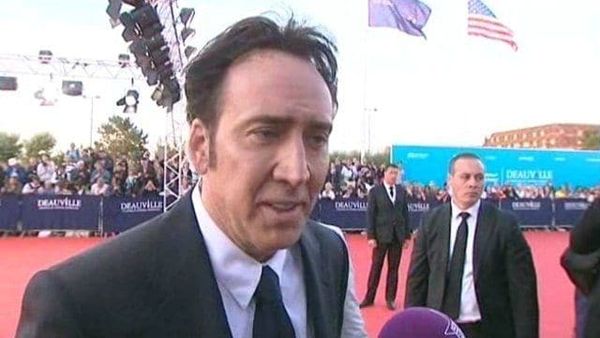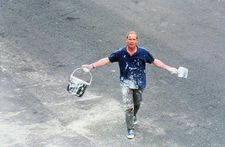 |
| Nicolas Cage walks the Deauville red carpet for the gala screening of his new film Joe |
Cage, 49, who is notoriously meticulous in his preparation, said he had explored different ways of finding the honesty in the performance. “And if that meant drinking, and videotaping myself drinking, and getting ideas about that, I was going to do it."
Cage, the subject of a special tribute at Deauville, talks about the role of a character who is trying to maintain control of his life while trying to protect a teenager, portrayed by Tye Sheridan, from his alcoholic father.
Do you see Joe as a comeback to more dramatic and intimate roles?
 |
| Nicolas Cage with Tye Sheridan as Joe and Gary in David Gordon Green's Joe |
Your character says he does not know who he is. Give us your take on who you think this man is.
NC: To me, Joe is whoever who you want him to be. But I think there is a little bit of Joe in every man or woman. I do see him as an enormously honest personality but for me to go beyond that would impinge on your own personal relationship with the character and the movie.
You have had an incredible career – what director or actor you would still like to film with?
NC: I am afraid that most of my heroes are dead. I am happy with everyone I have had the chance to work with, but especially today with David, who has a truly personal vision.
What was your specific preparation?
NC: I wanted to find a way to make Joe come to life in the most truthful and honest presentation. This meant trying not to act. Sometimes acting seems to be about creating a lie. In this case it was not about putting things on but about takings things off in the performance. I wanted to be as naked as possible. This meant recalling memories of my personal life in the last 12 years or so, being able to listen to those memories from my personal life, and bring them in to the performance. And I tried to do this without over-thinking about it. It was important for me to go to Austin, Texas, where I spent about spent a month working with Tye and getting to know David and his rythmns. I aimed to get comfortable with Tye so it seemed we had a relationship and there was a flow to the whole thing. The film is its owns entity but in the novel you can find little things and gems you can bring in to the character. And there were things I could put in to the character from my own life.
There is really a father/son relationship between the two and characters. Would you agree?
 |
| Nic Cage as Joe: 'I wanted to be as naked as possible.' |
Ten years ago you were in Deauville with Sonny. Do you have any more directorial projects – and does being a director influence your work as an actor?
NC: Absolutely. The opportunity to direct people as gifted as James Franco and Brenda Blethyn and Harry Dean Stanton, who are people at the top of their game, reignited my passion for film-acting. I am sorry I have not directed again – genuinely. I was living with that script for ten years and I was going to play in it but then I became too old. I have to now find a project that will engage my interest and help me to return to directing.
Do you want to play lighter comedic or romantic roles after this dark experience?
NC: I am happy with the way things are. I am blessed to work with my favourite creative people in the industry and I don’t really think about it too much in terms of what’s next. I just want to stay challenged and uncomfortable.
There was a significant canine presence in the film – were the animals an important part?
NC: The author of the book on which the film is based, Larry Brown, loved dogs and when he started to make it as a novelist, he acquired a few. He seemed to have an obsession with them. Once he became successful, he spent a lot of his money on dogs. I love dogs and I have dogs at home and I am very comfortable around them. Any time you have an interaction with animals on camera then magical things can happen. I have genuine affection for canines and I was able to use these feelings in the movie.





















